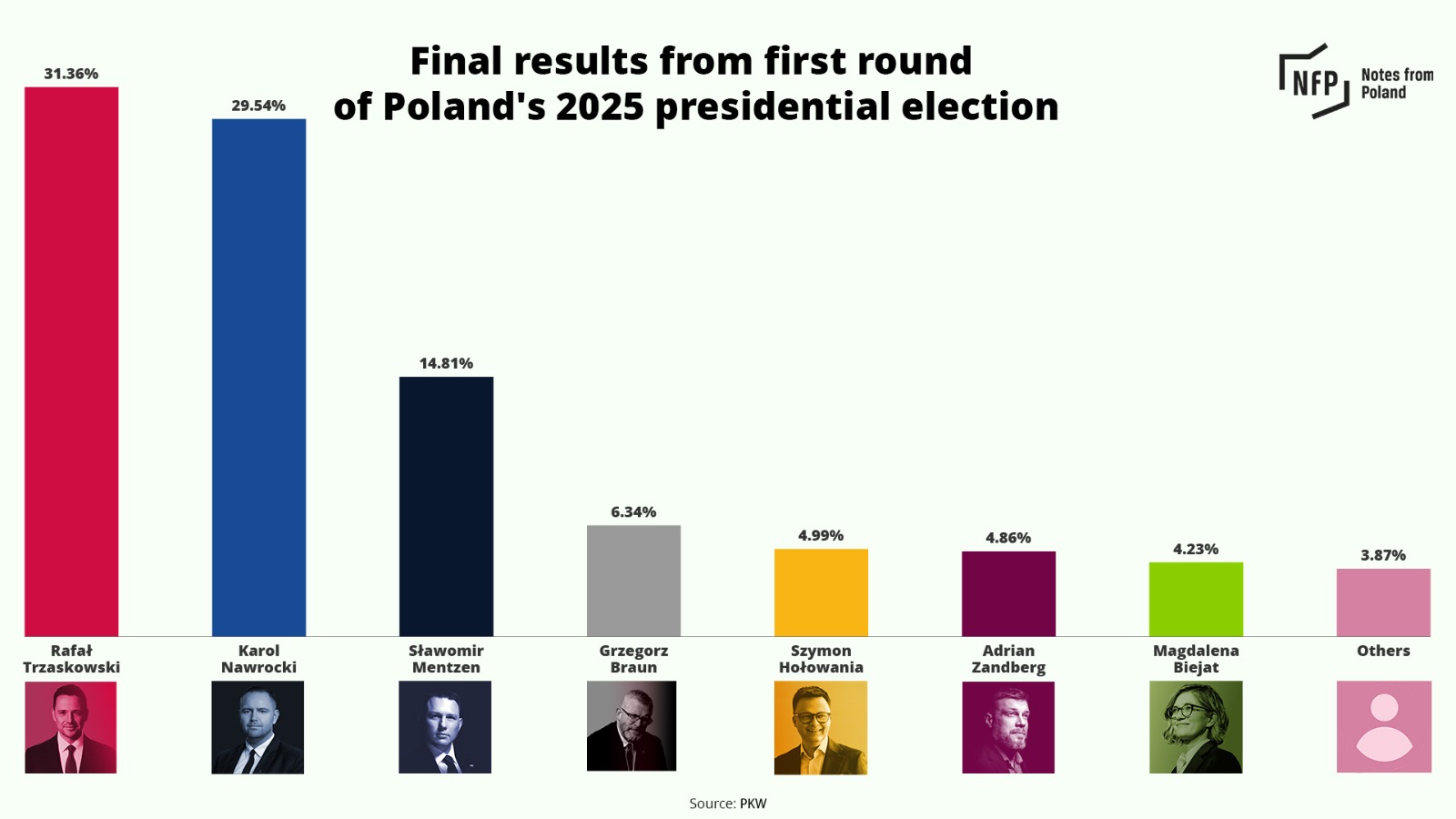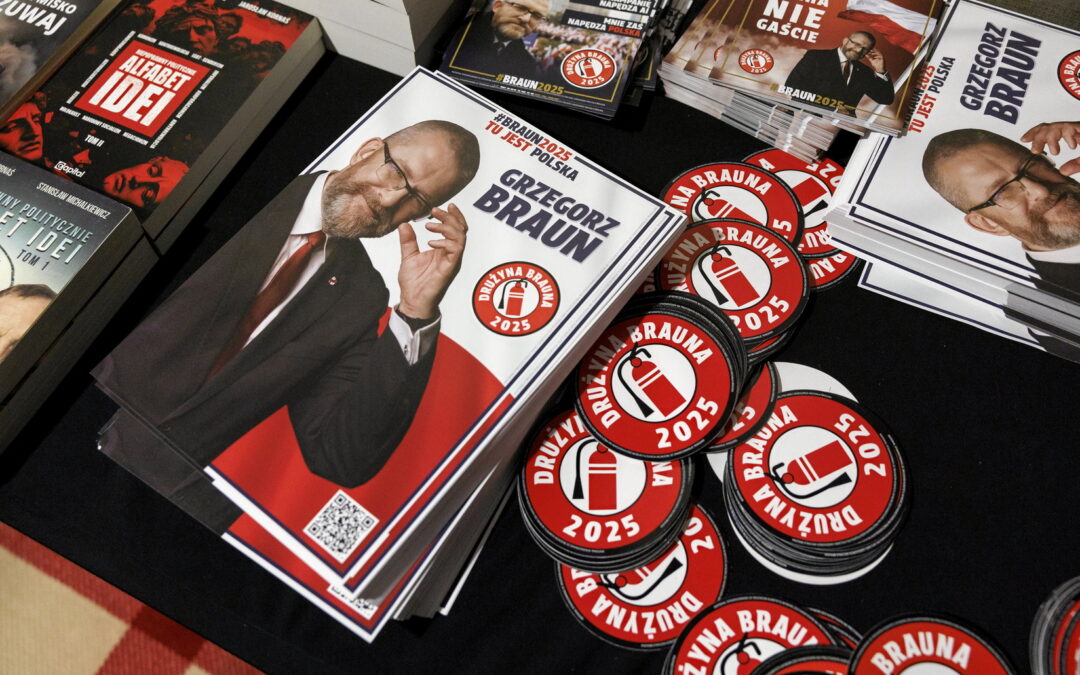Keep our news free from ads and paywalls by making a donation to support our work!

Notes from Poland is run by a small editorial team and is published by an independent, non-profit foundation that is funded through donations from our readers. We cannot do what we do without your support.
Conservative presidential candidate Karol Nawrocki has responded to a set of questions issued by Grzegorz Braun, an eliminated radical-right rival, asking whether the remaining two candidates would “reject Jewish claims” against Poland, oppose abortion, and “stop the Ukrainisation of Poland”.
Nawrocki, who is seeking support from rival candidates’ voters ahead of a run-off this Sunday against centrist Rafał Trzaskowski, told Braun he would “defend Poland against disgusting attacks” by Holocaust scholars, “protect life from conception”, and seek to penalise glorification of Ukrainian nationalist leader Stepan Bandera.
A oto odpowiedź na pytania zadane Kandydatom na @prezydentpl przez komitet polityczny Konfederacji @KoronyPolskiej – nadesłana do mojego biura ze sztabu @NawrockiKn👇 https://t.co/0E1tY2gPbf
— Grzegorz Braun (@GrzegorzBraun_) May 26, 2025
In the first round of the election on 18 May, Braun – who had run a campaign that was openly antisemitic, as well as anti-Ukrainian and anti-LGBT – finished fourth with 6.34% of the vote.
The top places were taken by Trzaskowski (31.36%), the candidate of the main ruling Civic Platform (PO) party, and Nawrocki (29.54%), supported by the opposition Law and Justice (PiS). They will meet in a second-round run-off on 1 June, and are now competing for the 39% of voters who backed their 11 eliminated rivals in the first round.
Both Nawrocki and Trzaskowski have already met with far-right leader Sławomir Mentzen, who came third with 14.81% of the vote, to discuss eight demands he issued to them. Nawrocki agreed to all eight of them – including opposing Ukraine’s NATO membership – while Trzaskowski accepted only four.
A survey published last week by UCE Research for the Onet news website found that 54.1% of Braun voters from the first round planned to support Nawrocki in the second while 12.5% would vote for Trzaskowski. The remainder were either unsure or planned not to vote at all.

Last week, Braun’s party, the Confederation of the Polish Crown (Konfederacja Korony Polskiej), issued a set of its own seven questions for the remaining two candidates to answer ahead of the second round.
The first two asked whether they would refuse to send Polish soldiers and military equipment to Ukraine, as well as take “decisive actions to…stop the Ukrainisation of Poland”, condemn the glorification of Bandera, and ensure the exhumation of Polish victims of World War Two massacres by Ukrainians.
The third called for rejecting the European Union’s migration pact and “stopping both legal and illegal immigration” while the fourth demanded rejection of the EU’s flagship climate policy, the Green Deal.
The fifth asked about preventing “legal infanticide”, meaning abortion, as well as “medical experiments on Poles, compulsory vaccinations, eugenic selection and euthanasia”, while the sixth called for action to be taken against those responsible for the response to the Covid pandemic.
Finally, the seventh question asked whether as president the candidate would bring about the exhumation of victims of the Jedwabne pogrom, “reject Jewish claims” against Poland, and “end Hanukkah celebrations in the presidential palace”.
In 1941, hundreds of Jews were massacred in the Polish town of Jedwabne. Official findings show that the pogrom was carried out by ethnic Poles in cooperation with the German occupiers. But many Polish nationalists reject that version of events and call for exhumations of the victims to ascertain the truth.
Officials and religious leaders gathered to mark the 80th anniversary of the Jedwabne pogrom, in which at least 340 Jews were killed by their Polish neighbours under the German Nazi occupation.
But commemoration of the event continues to stir controversy https://t.co/zJJqCpRoPI
— Notes from Poland 🇵🇱 (@notesfrompoland) July 12, 2021
On Sunday, Braun’s party revealed that Trzaskowski had not responded to their demands at all while Nawrocki had sent a letter offering his views.
Nawrocki wrote that he would not send Polish troops to Ukraine; would “unequivocally oppose Banderism”, including signing a law penalising it in Poland; and supports exhumation of Polish victims of wartime massacres by Ukrainian nationalists.
He also pledged to “take action to unilaterally terminate the migration pact and the Green Deal”, to “protect the Polish family from dangerous ideologies”, and to “protect life from conception to natural death”.
Meanwhile, Nawrocki said that, while he supports the current law regarding certain vaccinations being compulsory, “all other vaccinations should be solely a matter of personal choice”. He added that the government’s actions during the pandemic “saved millions of jobs and led Poland through this global crisis”.
"Jews are behind the pandemic," chanted the crowd at an anti-vaccine protest in Poland.
Separately, the far-right Confederation party, which sits in parliament, shared a video of a supporter saying she “does not want Jewry” in Poland https://t.co/XzqIDGzQU3
— Notes from Poland 🇵🇱 (@notesfrompoland) July 19, 2021
He did not refer specifically to Braun’s questions about Jews, but said that “all claims stemming from German war actions should be directed to Berlin, not to Warsaw”, and that he “will defend the good name of Poland and Poles against all the disgusting attacks by people such as [Jan] Grabowski, [Jan] Gross and [Barbara] Engelking”.
The latter three are Polish Holocaust scholars who have published research on the role that Poles played in crimes against Jews during and after World War Two.
Finally, Nawrocki said that he “takes my attachment to Christian values seriously, so I celebrate and promote holidays and the Polish traditions and customs associated with them”. Earlier this year, Nawrocki announced that, if elected, he would end the annual tradition of lighting Hanukkah candles in the presidential palace.
The presidential candidate of Poland’s conservative opposition PiS party says he would end the tradition of lighting Hanukkah candles with Jewish leaders in the presidential palace.
The practice began in 2006 under Lech Kaczyński and has continued since https://t.co/xJb42sWePx
— Notes from Poland 🇵🇱 (@notesfrompoland) January 13, 2025
In reply to Nawrocki’s letter, Braun’s party expressed its disappointment that he had ignored the issues of transferring military equipment to Ukraine, stopping the “Ukrainisation of Poland” and all immigration, and preventing “medical experiments, forced vaccinations, eugenic selection and euthanasia”.
“Our conclusion after analysing the content of Karol Nawrocki’s response and the lack of response from Rafał Trzaskowski: God, protect all of Poland!” wrote the party.
Last week, Braun claimed that some unnamed people “from around Karol Nawrocki” had offered Braun a presidential pardon in return for his support. Braun is facing a range of charges relating to various actions, including attacking a Hanukkah celebration in parliament.
However, Nawrocki’s campaign chief, Paweł Szefernaker quickly denied that claim, saying that “no one from the campaign or around it has promised anyone a pardon”. Nawrocki himself then told broadcaster RMF that he “hasn’t talked about it [a pardon] with Grzegorz Braun, nor has any member of my staff”.
The European Parliament has stripped Polish far-right MEP Gregorz Braun of immunity so that he can face charges in his homeland for a variety of alleged crimes, including attacking a Jewish religious celebration in parliament with a fire extinguisher https://t.co/PK4w7s0qiE
— Notes from Poland 🇵🇱 (@notesfrompoland) May 6, 2025
Trzaskowski, meanwhile, has been explicit in his rejection of Braun and all that he stands for. During a televised debate earlier this month, he walked off stage after Braun criticised him for wearing “a Jewish daffodil”, which he called “a symbol of shame”.
The yellow daffodil is a symbol of remembrance worn annually to commemorate the anniversary of the 1943 Warsaw Ghetto Uprising, in which Jews rose up against the Nazi-German occupiers.
Trzaskowski forcefully rejected the statement, interrupting Braun mid-sentence. “What are you talking about? What shame? It was the uprising in the ghetto. What are you talking about? These are the heroes of our history. I will not listen to this,” he said before walking away from the rostrum.
Since the first round of the election, three eliminated candidates – Szymon Hołownia, Magdalena Biejat and Joanna Senyszyn – have declared support for Trzaskowski.
A Polish presidential candidate has asked prosecutors to bring charges against one of her rivals for his antisemitic remarks during a TV debate.
He declared opposition to the "Judaisation" of Poland, saying "Jews have far too much say in Polish affairs" https://t.co/GyQYAl9Cte
— Notes from Poland 🇵🇱 (@notesfrompoland) April 29, 2025

Notes from Poland is run by a small editorial team and published by an independent, non-profit foundation that is funded through donations from our readers. We cannot do what we do without your support.
Main image credit: Patryk Ogorzalek / Agencja Wyborcza.pl

Daniel Tilles is editor-in-chief of Notes from Poland. He has written on Polish affairs for a wide range of publications, including Foreign Policy, POLITICO Europe, EUobserver and Dziennik Gazeta Prawna.


















